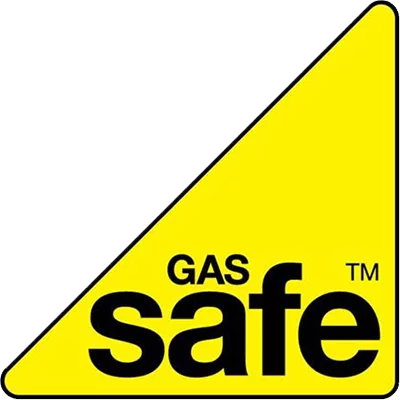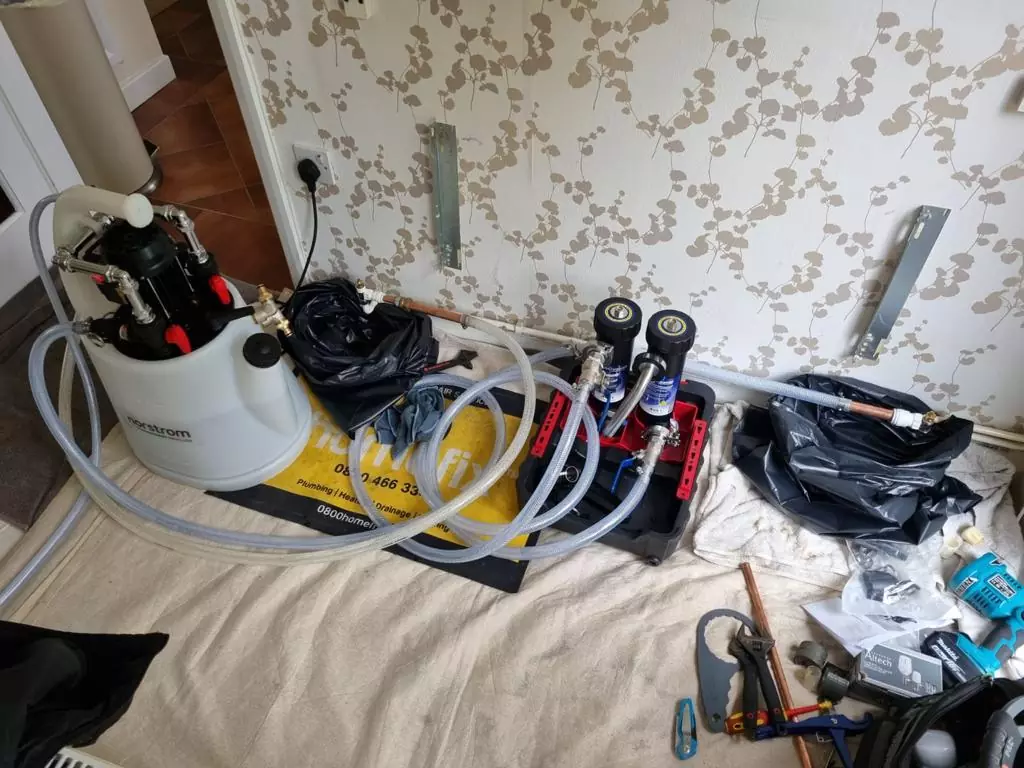If you’re experiencing issues with your central heating system, such as cold spots or strange noises, it may be time for a chemical power flush. A chemical power flush is a process that involves using chemicals to clean out your central heating system, removing any build-up of sludge or debris that may be causing problems.
During a chemical power flush, a professional will add a chemical cleaning agent to your central heating system, which will break down any sludge or debris that has built up over time. The cleaning agent will then be circulated through your system, using a high-pressure pump to dislodge any stubborn blockages. Once the cleaning agent has done its job, it will be flushed out of your system, leaving your central heating running more efficiently.
A chemical power flush is a great way to improve the performance of your central heating system and extend its lifespan. By removing any build-up of sludge or debris, you’ll be able to enjoy a warmer, more comfortable home, while also reducing your energy bills. If you’re considering a chemical power flush, it’s important to hire a professional who has experience in this area. They’ll be able to assess your system and recommend the best course of action to get your central heating running smoothly again.
Understanding Chemical Power Flush
If your central heating system is not working efficiently, it may be time for a power flush. A power flush is a process of cleaning the central heating system, removing sludge, debris and corrosion that has built up over time. Chemical power flush is one of the most effective ways of cleaning a central heating system.
Principles of Power Flushing
A chemical power flush involves using a chemical cleaner to break down the sludge and debris in the heating system. The chemical is added to the system and circulated for a period of time. The chemical cleaner is then drained out of the system, taking the sludge and debris with it. The system is then flushed with clean water to remove any remaining debris and chemical cleaner.
Benefits of a Chemical Power Flush
A chemical power flush can improve the efficiency of your central heating system. The removal of sludge and debris means that heat can be transferred more efficiently, reducing the amount of energy required to heat your home. This can lead to lower energy bills and a more environmentally friendly heating system.
A chemical power flush can also help to prolong the life of your heating system. Sludge and debris can cause corrosion in the heat exchanger, which can lead to leaks and ultimately the need for a new boiler. By removing the sludge and debris, a chemical power flush can help to prevent corrosion and prolong the life of your heating system.
Regular maintenance of your central heating system is important to ensure that it is working efficiently and to prevent costly repairs. A chemical power flush is a simple and effective way of maintaining your heating system and ensuring that it is working at its best.
In conclusion, a chemical power flush is an effective way of cleaning your central heating system, improving efficiency and prolonging the life of your heating system. It is a simple and cost-effective way of maintaining your heating system and ensuring that it is working at its best.
The Power Flushing Process
If you’re experiencing cold spots on your radiators or your heating system is not working efficiently, it may be time for a power flush. Power flushing is a process that cleans out your heating system by removing sludge, rust, and other debris that may have built up over time. Here’s what you need to know about the power flushing process.
Preparing for Power Flushing
Before starting the power flushing process, it is important to prepare your heating system. This includes turning off the power to your boiler, draining the system, and removing any components that may impede the flow of water. It is also important to ensure that any magnetic filters are cleaned and working properly.
Execution of the Power Flush
The power flushing process involves connecting a powerful pump to your heating system and running a mixture of hot water and chemicals through the pipes. This helps to break down any sludge or debris and flush it out of the system. The process can take several hours, depending on the size of your system and the amount of debris that needs to be removed.
During the power flushing process, it is important to monitor the pressure and flow of water to ensure that the system is not damaged. It is also important to follow all safety regulations and wear appropriate protective gear.
Post-Flush Assessment
After the power flushing process is complete, it is important to assess the system to ensure that it is working properly. This includes checking the flow of hot water, the temperature of the radiators, and the efficiency of the system. Any remaining debris should be removed from the system and the magnetic filter should be checked and cleaned if necessary.
Overall, power flushing can be an effective way to improve the efficiency of your heating system and extend its lifespan. By following the proper procedures and using the appropriate chemicals and equipment, you can help ensure that your heating system is working at its best.
Cost and Considerations
Estimating the Cost
When considering a chemical power flush, the cost can vary depending on a few factors. On average, the cost of a power flush for a standard three-bedroom house with six radiators can range from £300 to £500. However, the cost can increase if you have more radiators or if your heating system is more complex. It is always best to get a quote from a professional to get an accurate estimate of the cost.
Factors Affecting Price
Several factors can affect the price of a chemical power flush. The number of radiators you have in your home can affect the cost, as more radiators will require more time and chemicals to clean. The complexity of your heating system can also affect the cost, as some systems may require more work to flush properly.
Long-Term Savings
While a chemical power flush may seem like an unnecessary expense, it can actually save you money in the long run. A clean heating system can run more efficiently, which can lead to lower energy bills. Additionally, a power flush can extend the life of your heating system, which can save you money on costly repairs or replacements in the future.
Overall, a chemical power flush can be a cost-effective way to improve the efficiency and lifespan of your heating system. When considering a power flush, it is important to get a quote from a professional and to ensure that they are registered with the Financial Conduct Authority and backed by reputable lenders.
Choosing a Professional
When it comes to chemical power flush, it’s important to choose a professional who is qualified and experienced in the field. Here are some things to consider when choosing a professional.
Qualifications and Credentials
First and foremost, you want to make sure that the professional you choose is qualified and has the necessary credentials to perform a chemical power flush. Look for a Gas Safe registered engineer who is qualified to work on gas appliances and central heating systems.
A Gas Safe engineer has undergone rigorous training and assessment to ensure they have the necessary skills and knowledge to work safely and competently with gas. When choosing a professional, make sure to ask for their Gas Safe registration number and check it on the Gas Safe Register website to ensure they are registered and qualified.
Finding a Gas Safe Engineer
Finding a Gas Safe engineer who is experienced in chemical power flushing can be a challenge, but there are a few things you can do to make the process easier. Here are some tips:
- Ask for recommendations from friends, family, or colleagues who have had a chemical power flush done before. They may be able to recommend a reliable and experienced professional.
- Look for reviews and ratings online. There are many websites where customers can leave reviews and ratings for tradespeople, including Gas Safe engineers. This can give you an idea of the quality of service and level of experience of different professionals.
- Contact your local Gas Safe registered engineers and ask if they have experience with chemical power flushing. They may be able to provide you with references or examples of previous work they have done.
By taking the time to find a qualified and experienced Gas Safe engineer, you can ensure that your chemical power flush is done safely and effectively.
Frequently Asked Questions
What is the difference between a chemical flush and a power flush for central heating systems?
A chemical flush involves using a cleaning solution to remove sludge, rust, and debris from the central heating system. On the other hand, a power flush uses high-pressure water to flush out the system. Both methods are effective in removing contaminants from the system, but power flushing is more thorough and can address more severe blockages.
How much can one expect to pay for a chemical flush of a radiator?
The cost of a chemical flush can vary depending on the size of the system and the number of radiators that need to be flushed. On average, you can expect to pay between £300 and £500 for a chemical flush of a typical central heating system.
What steps are involved in performing a chemical flush on a central heating system?
The first step is to drain the system and add the cleaning solution. The solution is circulated through the system to break down and remove any sludge, rust, and debris. The system is then flushed with clean water to remove the cleaning solution and any remaining contaminants. Finally, the system is refilled with clean water and a corrosion inhibitor is added to prevent future build-up.
Can power flushing cause problems to the heating system, and how can they be mitigated?
Power flushing can cause leaks or damage to the system if it is not done correctly. However, this can be mitigated by ensuring that a qualified and experienced engineer performs the power flush. Additionally, the system should be checked for leaks and any necessary repairs should be made before the power flush.
Is it more cost-effective to power flush or replace radiators that are not functioning efficiently?
It depends on the severity of the problem. If the radiators are severely blocked, power flushing may be the more cost-effective solution. However, if the radiators are old and inefficient, it may be more cost-effective to replace them with newer, more efficient models.
How long is a chemical flush effective in maintaining the performance of a heating system?
The effectiveness of a chemical flush can vary depending on the condition of the system and how well it is maintained. In general, a chemical flush can maintain the performance of a heating system for several years. However, regular maintenance and the use of a corrosion inhibitor can help to extend the effectiveness of the chemical flush.



